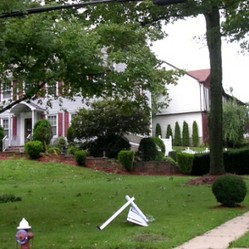An HOA, or homeowners association, is basically an organization that's created by owners or developers to oversee shared property. HOAs typically have legal authority to oversee homeowners and ensure agreed-upon rules are enforced. While there are a growing number of single family home communities governed by an HOA, most HOAs -- particularly Florida HOAs -- are comprised of townhomes or condominiums.

What is an HOA and What are Its Responsibilities?
HOAs are legal entities that govern community property, set rules and collect dues from homeowners. Find out more about HOAs and their responsibilities to owners here.
How a Homeowners Association Works
 As a legal entity, an HOA is set up to manage and then maintain common areas within a community, from the streets and landscaping to pools and clubhouses. All homeowners associations have a Declaration of Covenants, Conditions and Restrictions (CC&Rs for short), which outline the rules of the community. These rules are designed to improve the quality of life in the community as well as maintain property values for all owners. These rules apply to everyone in the community and must follow real estate law or condo law in the state. To pay for maintenance, HOAs collect dues, or fees, from all homeowners. This money it put into a collective pool and used for everything from maintaining recreational facilities and landscaping to offering security and snow removal.
As a legal entity, an HOA is set up to manage and then maintain common areas within a community, from the streets and landscaping to pools and clubhouses. All homeowners associations have a Declaration of Covenants, Conditions and Restrictions (CC&Rs for short), which outline the rules of the community. These rules are designed to improve the quality of life in the community as well as maintain property values for all owners. These rules apply to everyone in the community and must follow real estate law or condo law in the state. To pay for maintenance, HOAs collect dues, or fees, from all homeowners. This money it put into a collective pool and used for everything from maintaining recreational facilities and landscaping to offering security and snow removal.
Image: Sam Posnick at Flickr
Standard Characteristics of an HOA
Most homeowners associations are a non-profit corporation with legal authority to enforce bylaws, which can include everything from restricting weapons or potentially dangerous items like household BBQs to specific architectural and design standards, such as determining the type and height of grass and flowers.
All owners in the community are mandatory members of the association and pay monthly dues, along with occasional special assessments, which may be necessary to cover large or unexpected expenses.
The mandatory dues may range from only $50 to hundreds per month and this number is determined by the association's annual budget and expenses.
Most HOAs also have a board of directors, typically volunteer or elected homeowners, who make decisions.
Because homeowners association management can be daunting, most also employ the services of a property management company and an HOA attorney.
Services Performed by an HOA

So, what does an HOA do for homeowners exactly? Here are some of the most common tasks.
- Collect monthly assessments from homeowners
- Maintain financial statements and prepare an annual budget
- Maintain landscaping
- Enforce CC&Rs and rules that cover noise control, how property may be used, smoking, the exterior condition of the property, home improvements, pool use, etc
- Offer snow removal
- Maintain pool areas and club houses
- Offer security service
- Organize resident meetings and activities
- Create disaster plans and coordinate after a natural disaster (This is particularly common with Florida HOAs, which face the threat of hurricanes)
- Assess fees or penalties to delinquent homeowners or owners that do not abide rules and by-laws
- Pursue litigation in some cases
- Consult with an HOA lawyer to determine the legality of certain rules or in the case of litigation
- Conduct board meetings
Image: Firepile at Flickr
Responsibilities of an HOA
Along with homeowner association management comes a great deal of responsibility, including legal obligations. The following are the main obligations of an HOA.
Establish CC&Rs. This is the first obligation of any homeowners association as these legal documents detail how the association will run, which rules owners must follow, how the rules are enforced and what steps must be taken to change the CC&Rs. For this obligation, all HOAs need to consult an HOA attorney or law firm to make sure these rules comply with both federal and state laws.
Maintain and repair common areas, from the exterior of residential buildings to landscaping, laundry facilities, club houses and walkways.
Determine dues and collect assessments and fines. Because HOAs incur a certain level of expenses to provide services, monthly dues must be collected. This amount is set by the HOA and paid to the HOA. The HOA also reserves the right to place a lien on homes if owners fail to pay their assessments, which can lead to foreclosure.
Conduct meetings. All HOAs are required by law to hold regular meetings, some of which are only for board members. Minutes must be maintained on all meetings and made available to all owners.
Homeowners associations offer many advantages as owners work together to create rules that benefit everyone. HOAs also typically offer stable property values as well as access to amenities like golf course, pools and recreation centers. Because HOAs are governed by very complex laws which vary by state, consult a real estate attorney such as Association Law Group with questions about condo law, association lien services and management
You might also like
The Duck RaceWhy did a stream full of plastic ducks today draw a crowd of hundreds of peop...
Hurricane IreneImpact Of Hurricane Irene In My Town



 How to Deal with Owners Publicly Defaming Your HOAon 10/31/2012
How to Deal with Owners Publicly Defaming Your HOAon 10/31/2012
 The Problem of Hoarding and How an HOA Can Address iton 10/26/2012
The Problem of Hoarding and How an HOA Can Address iton 10/26/2012
 HOA Tips for Going Greenon 09/17/2012
HOA Tips for Going Greenon 09/17/2012
 How an HOA Should Respond to Letters to the Boardon 08/23/2012
How an HOA Should Respond to Letters to the Boardon 08/23/2012


Comments
As the Secretary of my Homeowner Association in Fort Collins, it’s sometimes a challenge trying to maintain work, family and my HOA duties . However, when I discovered Association Online all of that changed. No need to worry about piles of paperwork, their software is quite easy to use and all our HOA documents are stored and managed online. This allows our Board of Directors to operate in a more effective way. You should check them out at www.associationonline.com or call (970-226-1324). I highly recommend them for all Homeowner Association needs.